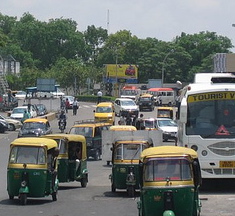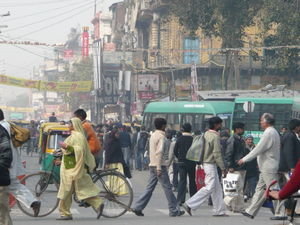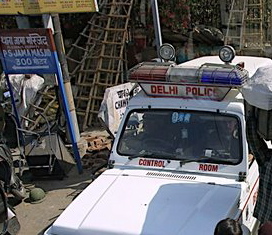 Business is slow at the Marin County Indian restaurant that Ram owns. In my opinion, he should take this time to do some cleaning in the back, but instead he leans on an elbow and tells me about his last visit to Delhi.
Business is slow at the Marin County Indian restaurant that Ram owns. In my opinion, he should take this time to do some cleaning in the back, but instead he leans on an elbow and tells me about his last visit to Delhi.
“A friend whose car I am borrowing is warning me if the brakes fail, do not bother to fix them. Someone will get in your way, and you will soon stop. But if the horn should fail, you must get it fixed at once. Without a horn, you cannot warn the people in front of you, and you will be responsible for any accident.”
In less than a fortnight, Ram tells me, the horn does fail, probably because he, like everyone else in Delhi, uses it to excess. So he finds a repair shop on the Inner Circle, the perimeter road around the city’s central, British-built park. Hundreds of shops ring this two-mile diameter greensward. As Ram sits waiting for the horn to be repaired (as with all things in India, this takes time, because there are no spare parts, so whatever is broken must be mended, not replaced), he marvels at the teeming throng. Thousands pass by him in the hour he sits.
At last his gaze fixes on one man, a peddler with a rough-hewn food cart that is parked on a street that spokes out from the Inner Circle. The peddler’s counter top is heaped with dozens of breads, a large bowl of cooked garbanzo beans, a pile of leaves stacked for use as plates, and various pots of condiments. His hands move like a dancer’s trained feet—in seconds he has loaded a leaf with garbanzos, slathered on the proper condiments, and dropped on a piece of bread. Then with a whisk of a wrist, the leaf is exchanged for a rupee. A ten-year-old boy, a son Ram assumes, cleans up and keeps the various piles properly stacked. In a span of 45 minutes, Ram estimates that he serves 100 people.
 “I am thinking,” Ram tells me, “that McDonalds can learn from this man, but suddenly there is much yelling and scuffling of crowds. Police, or some manner of inspector constables, have descended upon the peddler, who has obviously been selling his wares without the necessary permit. His foodstuffs are swept to the ground, and the food cart is lifted onto the back of a truck. Several other peddlers’ carts are already on the truck. This peddler is yelling, pleading in the name of his wife and family, offering to move somewhere else, finally falling to his knees in front of the officer in charge, begging for a chance to do what must be done to set things right. He is howling, ‘This is my only work—please sir. My family will be starving.’ There is loud wailing, but all to no avail. The truck departs.”
“I am thinking,” Ram tells me, “that McDonalds can learn from this man, but suddenly there is much yelling and scuffling of crowds. Police, or some manner of inspector constables, have descended upon the peddler, who has obviously been selling his wares without the necessary permit. His foodstuffs are swept to the ground, and the food cart is lifted onto the back of a truck. Several other peddlers’ carts are already on the truck. This peddler is yelling, pleading in the name of his wife and family, offering to move somewhere else, finally falling to his knees in front of the officer in charge, begging for a chance to do what must be done to set things right. He is howling, ‘This is my only work—please sir. My family will be starving.’ There is loud wailing, but all to no avail. The truck departs.”
As soon as the police truck drove off, Ram relates, the crowd resumed its relentless flow, and the peddler’s agony ceased abruptly. He reached into his pocket for money and sent the boy for a couple of glasses of tea.
“I was very surprised,” Ram explains. “Here was a man whose family was soon to be starving, and he is sitting and sipping tea.”
Ram pauses to answer the phone: a takeout order that he relays to the kitchen. When he is finished, he takes his time continuing the tale. I sip tea. Finally…
“I should not have been so concerned. This man, he was sipping tea only 15 minutes, waiting only for police to be far away. Then, from out of an alley, he is pulling another food cart, identical to the first. In a few more minutes he is back in business. I am impressed. This is Indian fast food in more ways than one!”





